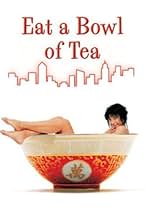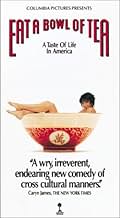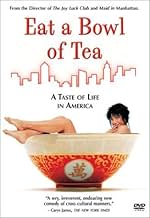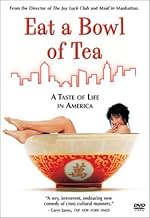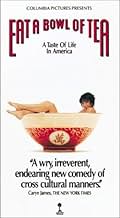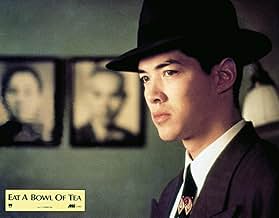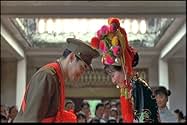Ajouter une intrigue dans votre langueA study in culture bridging, including ... a new US-born husband, trying to work within the traditional ways, a new China-born wife, eager to join the "dream" of America, two family-minded f... Tout lireA study in culture bridging, including ... a new US-born husband, trying to work within the traditional ways, a new China-born wife, eager to join the "dream" of America, two family-minded fathers, lots of gender-related social bifurcations.A study in culture bridging, including ... a new US-born husband, trying to work within the traditional ways, a new China-born wife, eager to join the "dream" of America, two family-minded fathers, lots of gender-related social bifurcations.
- Réalisation
- Scénario
- Casting principal
Sau-Kei Lee
- Bok Fat
- (as Lee Sau Kee)
Siu-Ming Lau
- Lee Gong
- (as Lau Siu Ming)
Fan Hui
- Ben Loy's Mom
- (as Hui Fun)
Helena Law
- Aunt Gim
- (as Law Lan)
Yuen-Yee Ng
- Third Sister
- (as Ng Yurn Yee)
Ta Lei
- Movie Translator
- (as Lui Tat)
Eric Tsang
- Ah Song
- (as Eric Tsang Chi Wai)
Wai Wong
- Chuck Ting
- (as Wong Wai)
Yu-Yung Teng
- Fat Man
- (as Tang Shun Nin)
Michael Ming-Yang Lee
- Old Lum
- (as Michael Lee)
Wing-Tat Woo
- Sum Woo
- (as Woo Wang Tat)
Avis à la une
I remember seeing portions of this film shot at the now defunct and torn down San Francisco Studios. It was an interesting project that was one of many independent films being funded and shot at the time. My one anecdotal memory is seeing much of the crew and the studio employees being ushered out of the infamous Stage 2 (a warehouse like structure with little to no baffling, that served more as a storage area than an actual sound-stage) for the "love making" scenes. Seeing this film over a decade later I can't really understand what all the hub-bub was about ... unless the actors were nude underneath the sheets or something. In any event the bedroom scenes were shot sans an audience.
Oh well.
It's a nice little film that, for some reason, is labeled by Blockbuster Video as a "comedy." Certainly there're a couple of humorous moments, but once again the marketing types pull a bait-and-switch on this customer by labeling a light drama a comedy. This is NOT a comedy. However it does raise a smile here and there, and occasionally a chuckle, and, in spite of the intentional mis-labeling, it is a very good film.
The script moves along well enough. There's a fine story here, but the film's title, for myself, is a missed opportunity. And, unlike in other films, the cultural and generational gaps aren't played up to the hilt. That's a definite plus for this movie. Quality over quantity is given a premium in this movie. Yet at the same time the "message" and title of the film is almost too subtle to grasp, and is only made openly manifest in the final scenes. Even then you have to be somewhat on your toes to catch it.
It's a likable film. The lighting is nicely done, and was the foremost technical aspect that I noticed in this film. The cinematography is intimate and very straightforward. The acting is very fine; no over the top performances, nor understated moments; all characters are given appropriate exposure, and state their messages with emotional clarity.
The film is somewhat slow, but not overly, as is Wayne Wang's style. Overall a well stated film regarding Chinese-American society (specifically a newly wed couple, circa post WW2). It's by no means a gut-busting comedy, though there are comic moments in it. If you're expecting lots of laughs, then don't see this film. If you're expecting some mildly humorous situations told in a dramatic vein, then this film will probably entertain :)
Enjoy!
Oh well.
It's a nice little film that, for some reason, is labeled by Blockbuster Video as a "comedy." Certainly there're a couple of humorous moments, but once again the marketing types pull a bait-and-switch on this customer by labeling a light drama a comedy. This is NOT a comedy. However it does raise a smile here and there, and occasionally a chuckle, and, in spite of the intentional mis-labeling, it is a very good film.
The script moves along well enough. There's a fine story here, but the film's title, for myself, is a missed opportunity. And, unlike in other films, the cultural and generational gaps aren't played up to the hilt. That's a definite plus for this movie. Quality over quantity is given a premium in this movie. Yet at the same time the "message" and title of the film is almost too subtle to grasp, and is only made openly manifest in the final scenes. Even then you have to be somewhat on your toes to catch it.
It's a likable film. The lighting is nicely done, and was the foremost technical aspect that I noticed in this film. The cinematography is intimate and very straightforward. The acting is very fine; no over the top performances, nor understated moments; all characters are given appropriate exposure, and state their messages with emotional clarity.
The film is somewhat slow, but not overly, as is Wayne Wang's style. Overall a well stated film regarding Chinese-American society (specifically a newly wed couple, circa post WW2). It's by no means a gut-busting comedy, though there are comic moments in it. If you're expecting lots of laughs, then don't see this film. If you're expecting some mildly humorous situations told in a dramatic vein, then this film will probably entertain :)
Enjoy!
A few years after WWII, a young Asian-American man who served his country is sent off to China by his father in the hopes of bringing back a bride. His mother and extended family are still over there, having been separated for decades because of the Chinese Exclusion Act. He's introduced to a young woman, they marry, and then return to America.
The films strengths are in its representation. We see Asian-Americans as real people here, with different personalities, multi-lingual, and having the same problems anyone else has. They have a tightknit community, but are patriotic and assimilated, particularly the younger generation. The stress on the young couple is both cultural (the pressure to produce kids, the lack of privacy) as well as universal (work stress leading to problems in the bedroom, spending too much time in front of the TV, and infidelity). The story went to places I really did not expect it to go, touching on comedy, romance, and drama, and I liked that. I also liked the visibility on the Exclusion Act, which serves as a backdrop to the story, and other little elements, including the reference to Japanese internment when the Korean War starts brewing (fearing it may happen to them), as well as the guy being bruised up after being in police custody.
Undermining all this is the film's acting, which let's just say didn't deserve any awards, as cute as the lead couple are (Cora Miao and Russell Wong). There are a few good moments from one of the old fathers (Victor Wong), but mostly it seemed staged and with poor performances, giving the film a rather lightweight feel. The film tips its hat to both Lost Horizon (1937) and The Lady From Shanghai (1947) which was a lovely touch, but just doesn't conjure up the depth of emotion of the scenes from those films. It kept me engaged from beginning to end though, and director Wayne Wang moved things along nicely. I'm glad I saw it, and think it's worth checking out.
The films strengths are in its representation. We see Asian-Americans as real people here, with different personalities, multi-lingual, and having the same problems anyone else has. They have a tightknit community, but are patriotic and assimilated, particularly the younger generation. The stress on the young couple is both cultural (the pressure to produce kids, the lack of privacy) as well as universal (work stress leading to problems in the bedroom, spending too much time in front of the TV, and infidelity). The story went to places I really did not expect it to go, touching on comedy, romance, and drama, and I liked that. I also liked the visibility on the Exclusion Act, which serves as a backdrop to the story, and other little elements, including the reference to Japanese internment when the Korean War starts brewing (fearing it may happen to them), as well as the guy being bruised up after being in police custody.
Undermining all this is the film's acting, which let's just say didn't deserve any awards, as cute as the lead couple are (Cora Miao and Russell Wong). There are a few good moments from one of the old fathers (Victor Wong), but mostly it seemed staged and with poor performances, giving the film a rather lightweight feel. The film tips its hat to both Lost Horizon (1937) and The Lady From Shanghai (1947) which was a lovely touch, but just doesn't conjure up the depth of emotion of the scenes from those films. It kept me engaged from beginning to end though, and director Wayne Wang moved things along nicely. I'm glad I saw it, and think it's worth checking out.
A rarity in that we have an American made Chinese film that isn't based on Triad violence.
A breath of fresh air it is.
Young man and woman romance each other in America. Said couple is Chinese. They wish to stick to the traditions but adapt to their new homeland.
A romantic film that you can bring the wife or girlfriend to. And anyone into China or Asia will like it too. The culture gets a good going over here. In a positive way mind you.
And there is a lot of truth to it all too. Yes, elder Chinese men came to the U.S. alone and sometimes never saw their wives for 20-30 years. These marriages lasted. Impressive.
Romance with steamed dumplings here. Nicely done Wayne.
A breath of fresh air it is.
Young man and woman romance each other in America. Said couple is Chinese. They wish to stick to the traditions but adapt to their new homeland.
A romantic film that you can bring the wife or girlfriend to. And anyone into China or Asia will like it too. The culture gets a good going over here. In a positive way mind you.
And there is a lot of truth to it all too. Yes, elder Chinese men came to the U.S. alone and sometimes never saw their wives for 20-30 years. These marriages lasted. Impressive.
Romance with steamed dumplings here. Nicely done Wayne.
We selected this film on the merits of the many famous HK actors involved, so I didn't notice its labeling as a 'comedy' until we got it home. True, it has comedic moments, but so does the Bourne Identity.
The review here also lists the film as Mandarin with English subtitles; it is in Cantonese, with some characters speaking a regional dialect.
The story centers around that period in US history just after WWII where, for the first time, Chinese immigrants were allowed to apply for full citizenship and allowed to bring wives from China; the story follows a young ex-serviceman whose father sends him home to bring back one of the first of these wives. In a few days he's thrust from the club-hopping carefree vet to take his full traditional role as First-Son with all it's trappings and responsibilities, all this on top of he and his wife being one of the first of their kind, a true Chinese-American family.
Put yourself there, you'll agree, this is a lot to heap on a pair of 20-somethings, it wears them down, things fall apart.
It is, in a sense, the same old story, as they say, boy meets girl, boy loses girl, boy finds girl, love always wins, love never loses, put your money on love sort of story, well shot, well put together. It's about an important time in our history while also an important time in all our lives, nothing to shower with awards, but a good story well told and well worth the rental.
The review here also lists the film as Mandarin with English subtitles; it is in Cantonese, with some characters speaking a regional dialect.
The story centers around that period in US history just after WWII where, for the first time, Chinese immigrants were allowed to apply for full citizenship and allowed to bring wives from China; the story follows a young ex-serviceman whose father sends him home to bring back one of the first of these wives. In a few days he's thrust from the club-hopping carefree vet to take his full traditional role as First-Son with all it's trappings and responsibilities, all this on top of he and his wife being one of the first of their kind, a true Chinese-American family.
Put yourself there, you'll agree, this is a lot to heap on a pair of 20-somethings, it wears them down, things fall apart.
It is, in a sense, the same old story, as they say, boy meets girl, boy loses girl, boy finds girl, love always wins, love never loses, put your money on love sort of story, well shot, well put together. It's about an important time in our history while also an important time in all our lives, nothing to shower with awards, but a good story well told and well worth the rental.
Older cultures coming to a new land. Chinese americans coming to america. At first, due to the immigration laws, it could only be the male workers. Then, when wives were allowed to come to the U. S., they brought their customs and points of view. Pride, respect, outlook on family. When Ben Loy (Russell Wong) gets married, but hasn't come up with offspring, his wife Mai Oi ( Cora Miao) thinks she has a solution... at least to some of her problems. Will this help, or will it only cause more problems? This is all about family pride, revenge, resolving issues within the community, and not involving outsiders. It's quite good. Directed by Wayne Wang, who also happens to be married to Maio, the female lead. Wang would also do the Joy Luck Club a couple years after this.
Le saviez-vous
- AnecdotesThe movie's ''Eat a Bowl of Tea'' title is a literal English translation to a Cantonese Chinese phrase that means "take your medicine" or "swallow your medicine".
- ConnexionsFeatured in The Slanted Screen (2006)
Meilleurs choix
Connectez-vous pour évaluer et suivre la liste de favoris afin de recevoir des recommandations personnalisées
- How long is Eat a Bowl of Tea?Alimenté par Alexa
Détails
Box-office
- Montant brut aux États-Unis et au Canada
- 231 423 $US
Contribuer à cette page
Suggérer une modification ou ajouter du contenu manquant


